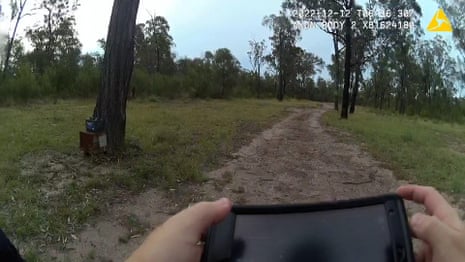Queensland police considers the Wieambilla shootings an act of terrorism, and there is an open terrorism file on the attack, the deputy commissioner, Cheryl Scanlon, told an inquest into the killings on Wednesday.
Gareth, Nathaniel and Stacey Train ambushed and killed constables Rachel McCrow and Matthew Arnold and civilian Alan Dare at their remote property 300 kilometres west of Brisbane on 12 December 2022. They were later killed in a shootout with specialist tactical police.
The coronial inquest sat for its 15th day on Wednesday. State coroner Terry Ryan heard evidence from a series of police officers and a psychiatrist about lessons learned as a result of the six deaths.
Queensland police labelled the shootings a “religiously motivated” terrorist attack in the months after the attack. Donald Day Jr, an American who was in contact with the Trains, was arrested in the US 2023.
Scanlon told the inquest she believes personally that the massacre was a terrorist incident and “the terrorism investigation is an open matter here in Queensland”.
“We have a current and open terrorism investigation. That matter is not yet complete. There is another individual who is a US national, who has been named publicly, is yet to go to trial,” she said.
“I don’t propose to discuss the ongoing terrorism investigation before the inquest, given the sensitivities.”
The terrorism label has been disputed by some witnesses and parties represented at the inquest.
Deakin University associate prof Josh Roose, an expert in radicalisation, testified earlier in August that the incident was Australia’s first Christian terrorist attack.
But forensic psychiatrist Andrew Aboud said the same week that the cause of the attack was “a psychiatric problem” and the Trains did not have a broader message or agenda than those generated by delusional personality disorder.
Scanlon was questioned whether the Trains fulfilled the definition under commonwealth legislation that their acts be influencing the government or intimidating the public (or a section thereof).
“You can suffer mental illness, but you can still be involved in a terrorist act,” she said.
“This is a live terrorism investigation that is incomplete. There is another individual to face trial and our investigation is not yet complete.”
The inquest also heard from detective inspector Jason Hindmarsh, the senior investigator for the ethical standards command investigation, who testified about potential improvements in police operations.
The inquest heard that multiple officers couldn’t make radio contact during the shootings, including slain officer Rachel McCrow and survivors Keely Brough and Randall Kirk.
after newsletter promotion
Officers at the scene instead communicated by mobile phone.
Hindmarsh said later tests showed the Wieambilla area was covered by a nearby radio tower, with quality rated “four out of five”.
He said the officers were likely confused about the correct channel to use.
“It was not an infrastructure issue, but an issue of education and induction,” he said.
Hindmarsh said the state “master list” of radio channels was out of date and didn’t have the right channel for Wieambilla. It has since been updated, he said, and made available to all officers at all times. For instance, all police vehicles will include the list on a QR code, he said.
None of the police were wearing ballistic vests at Wieambilla, but Hindmarsh said even if Arnold had been he still would have been killed.
“The calibre of that weapon was far in excess of the ballistic capabilities [of a vest].” he said.
Since the killings, Queensland police has rolled out a new ballistic vest. Hindmarsh said these wouldn’t have stopped the rifle rounds fired at them either.
Weapons licensing group officer Inspector Cameron Barwick told the court on Wednesday that a decision to revoke weapons licences held by Nathaniel Train had not taken effect at the time of his death, because they were never served on him in person.
The licensing branch tried to serve him at out of date addresses in Cairns and Innisfail, he said.







